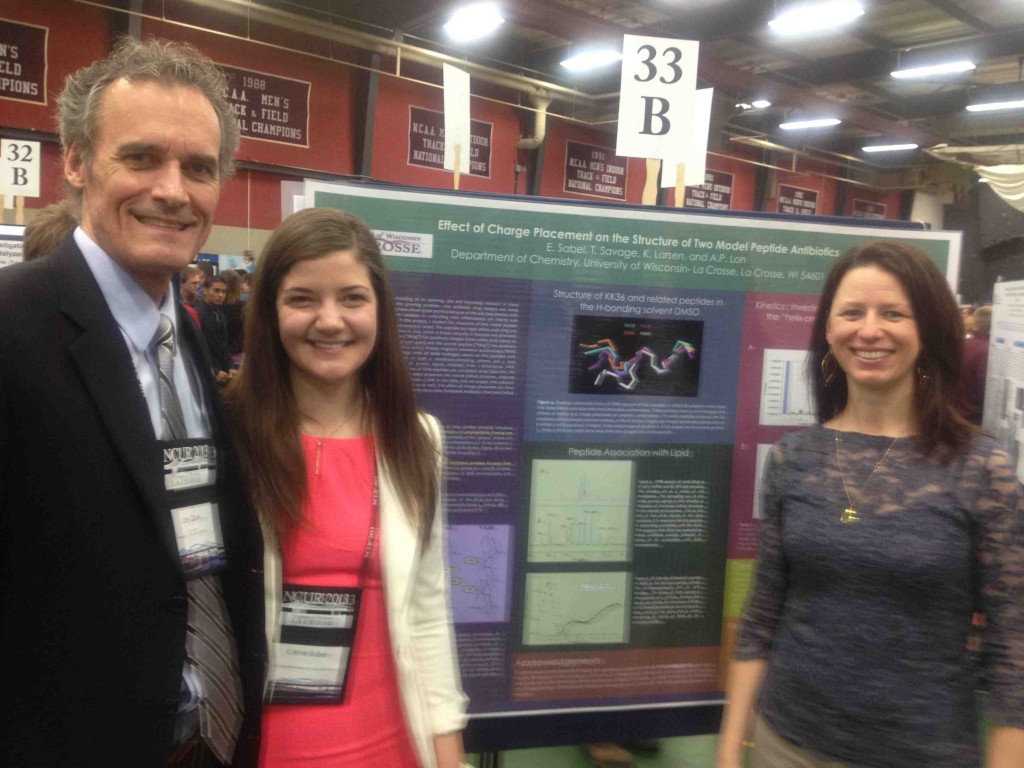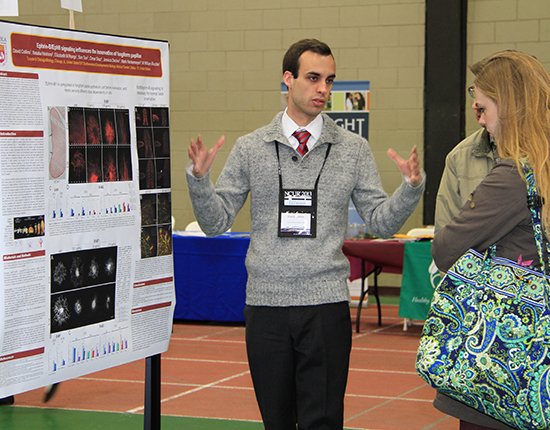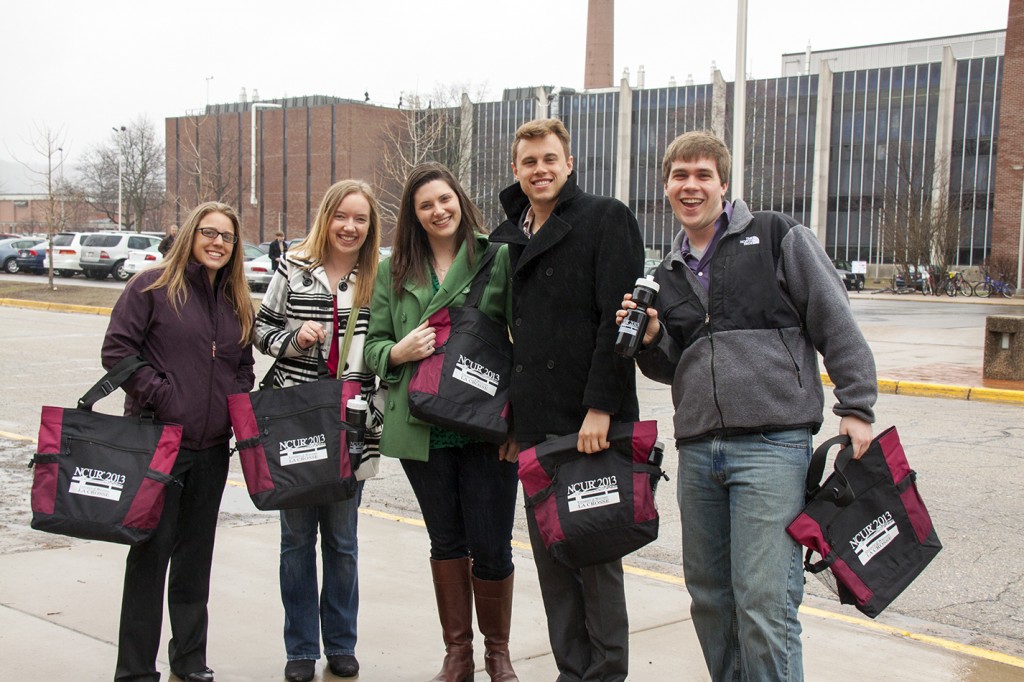Posted 2:01 p.m. Wednesday, April 24, 2013

A UW-L student and her professor head to Capitol Hill to share their research.
 UW-L Chancellor Joe Gow with chemistry student Emma E. Sabel and Chemistry and Biochemistry Professor Adrienne Loh.[/caption]
UW-L Chancellor Joe Gow with chemistry student Emma E. Sabel and Chemistry and Biochemistry Professor Adrienne Loh.[/caption]
Undergraduate Research & Creativity still in spotlight at UW-L
Undergraduate Research & Creativity will stay in the forefront at UW-La Crosse for a third week in a row when a student and her professor head to Capitol Hill to share their research. Chemistry student Emma E. Sabel, winner in a national competition sponsored by the Council on Undergraduate Research, will visit Washington, D.C., Wednesday, April 24, to participate in a poster session with fellow winners from across the country. Her poster, “Shape Matters: How We Can Design Structural Features That Are Relevant to Antibiotic Peptide Function” will be displayed in the Rayburn House Office Building from 5-7 p.m. The Capitol Hill visit follows a national undergraduate research conference on campus April 11-13. Also, at the annual “Posters in the Rotunda” at the capitol in Madison April 17, seven UW-L students were among 150 UW students sharing their research with legislators. Sabel’s faculty mentor Professor Adrienne Loh of the Chemistry and Biochemistry Department says participation in undergraduate research has a wide range of positive outcomes. “It gives students an opportunity to connect seemingly discrete concepts from individual courses into a more unified understanding of the discipline,” Loh explains. “This broader perspective helps students to think more creatively and become better problem solvers.” Loh says students who participate in undergraduate research also hone oral and written communication skills, which are essential to success in any profession. The experience also helps create strong, lifetime mentor relationships. [caption id="attachment_970" align="alignleft" width="440"] Students presented their research posters as part of the National Conference on Undergraduate Research at UW-L, April 11-13.[/caption]
“I have former research students, now professionals, who I continue to connect with in a meaningful way as they move through their careers and life experiences,” says Loh. “For many students, it also provides an opportunity to excel in a non-graded forum, where their work ethic, energy and love of the discipline are rewarded.”
Needs of the university and faculty are also advanced by providing person-hours to perform the research, resulting in publications and grant awards based on the students' work. “Undergraduate research provides tangible benefits to the students, faculty mentors and university,” notes Loh.
Along with helping students excel, undergraduate research enriches faculty mentors as well, says Loh. “I have had the pleasure of working with students of diverse academic and cultural backgrounds and, in every instance, I can say that I also grew as a scientist and person in the process,” she notes. “I am a better faculty member as a result of my role as a faculty mentor to undergraduate researchers.”
[caption id="attachment_977" align="alignright" width="491"]
Students presented their research posters as part of the National Conference on Undergraduate Research at UW-L, April 11-13.[/caption]
“I have former research students, now professionals, who I continue to connect with in a meaningful way as they move through their careers and life experiences,” says Loh. “For many students, it also provides an opportunity to excel in a non-graded forum, where their work ethic, energy and love of the discipline are rewarded.”
Needs of the university and faculty are also advanced by providing person-hours to perform the research, resulting in publications and grant awards based on the students' work. “Undergraduate research provides tangible benefits to the students, faculty mentors and university,” notes Loh.
Along with helping students excel, undergraduate research enriches faculty mentors as well, says Loh. “I have had the pleasure of working with students of diverse academic and cultural backgrounds and, in every instance, I can say that I also grew as a scientist and person in the process,” she notes. “I am a better faculty member as a result of my role as a faculty mentor to undergraduate researchers.”
[caption id="attachment_977" align="alignright" width="491"] UW-L hosted students from 48 states and seven countries for the National Conference on Undergraduate Research April 11-13.[/caption]
Studies show that undergraduate research leads to better job readiness, encompassing a broad range of student talents, interests and skills across academic disciplines. Additionally, participation in undergraduate research contributes to improved student retention and graduation rates. UW System leaders believe that broader participation in undergraduate research will provide students with the knowledge and skills they need for 21st-century jobs, preparing graduates to succeed in a world that values innovation, problem-solving, teamwork and collaboration.
UW-L Chancellor Joe Gow says undergraduate research also impacts the state’s economy. “Clearly, it will take creative, new ideas to solve our economic challenges, and undergraduate research promotes exactly the kind of innovative thinking we need to move our state forward,” notes Gow.
UW-L hosted students from 48 states and seven countries for the National Conference on Undergraduate Research April 11-13.[/caption]
Studies show that undergraduate research leads to better job readiness, encompassing a broad range of student talents, interests and skills across academic disciplines. Additionally, participation in undergraduate research contributes to improved student retention and graduation rates. UW System leaders believe that broader participation in undergraduate research will provide students with the knowledge and skills they need for 21st-century jobs, preparing graduates to succeed in a world that values innovation, problem-solving, teamwork and collaboration.
UW-L Chancellor Joe Gow says undergraduate research also impacts the state’s economy. “Clearly, it will take creative, new ideas to solve our economic challenges, and undergraduate research promotes exactly the kind of innovative thinking we need to move our state forward,” notes Gow.
